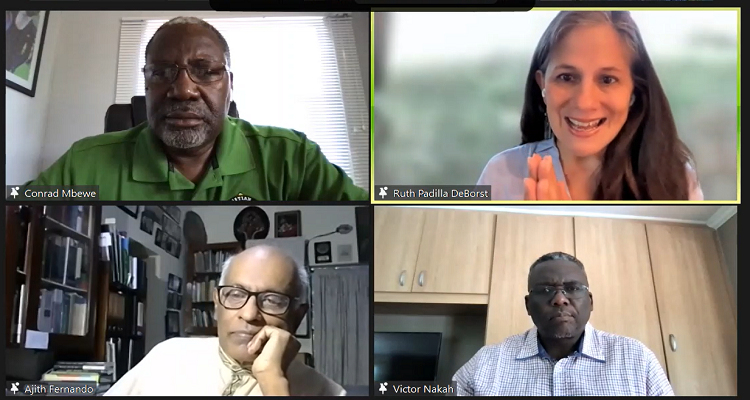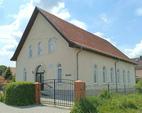As the second part of the Lausanne Theology Working Group’s “The Good News in a World of Fake News” series, a webinar themed “Being Shaped by the Story” was held on November 5.
Following the first webinar, called “Knowing the Story”, which stressed the importance of fully understanding the biblical gospel and warned listeners of several common forms of distorted gospels, this webinar focused on how the gospel shapes believers’ lifestyle.
Hosted by Conrad Mbewe, pastor of Kabwata Baptist Church in Zambia, the webinar was joined by three panelists: Ruth Padilla DeBorst, dean of Community of Interdisciplinary Theological Studies of Costa Rica, Ajith Fernando, teaching director of Youth for Christ of Sri Lanka, and Victor Nakah, vice-chairman of Lausanne Theology Working Group from Zimbabwe.
These leaders in South America, Asia, and Africa agreed that they saw a gap between the way of life that confessed Christians adopt and the gospel that they believe.
“The church in Africa is still being described as ‘one mile wide, one inch deep”, shared Victor Nakah. “The ‘one mild wide’ is the sheer number of people who confess to be Christians, and the ‘one inch deep’ is the shallowness of the church, evidenced in a number of areas. There are still too many corners of life which gospel has not touched.” Quoting from his friend, Victor used the word “gospel gap” to describe the phenomenon of confessing to being a Christian yet not living as a Christian.
In Sri Lanka, Ajith Fernando observed something different in this gospel gap.
“Christians see the Scripture as something to be defended and they keep the rituals in the Scripture but not necessarily the morals in the Scripture”, said Fernando. “One of the big challenges we have is to develop a new attitude towards Scripture,” said Fernando.
Being in Sri Lanka, where culture is massively shaped by Buddhism and Hinduism, Fernando particularly emphasized the transforming of the mind and gaining the knowledge of God.
“As a person comes to Christ from another faith, their understanding of God is very different to the biblical understanding. The biblical understanding of a loving God, entering into a covenantal relationship, and forming a day-to-day relationship with God our father is so different from the idea that they come from regarding God, where they would come to God as they come to a doctor for prescriptions of problems.”
He stressed that, instead of “transferring” their old idea of God into their new Christian faith, these new converters must be “transformed”. The gospel and the knowledge of God often acted as a doorway through which people come to faith, yet they should by no means remain as merely a doorway.
“The gospel of Christ Jesus, the true gospel, is something that needs to be lived out daily. It’s not just about getting ‘in’”, said Ruth Padilla DeBorst. “The good news of Jesus Christ demands daily discipleship, following the footsteps of Jesus.”
DeBorst pointed out that many Christians reduced the gospel into something that was limited in the religious life, something that only addresses the afterlife or a personal relationship with God.
“But actually, the gospel is something that filters through every single dimension of our life: our individual, social, economic, political, and ecological life. God’s light, goodness and presence need to be witnessed to these areas.”
“The gospel not only saves us but also forms us, feeds us, nourishes us and changes us. The gospel touches every corner of our lives. In other words, the gospel demands ethical transformation.” Nakah referred to the “salt and light” motif in the Bible, which emphasizes the change and impact that the gospel brings about through the Christian life.
“If you put a little salt on your wound, salt ‘bites’, in other words, it makes some people uncomfortable. In the same way, light not only helps you see where you are going, but it also exposes darkness. So being the salt and light, means you become known in your community as the person who acts in truth and love, and the person who exposes.”
Nakah shared that, after he became a Christian at the age of 17 in a youth camp, it became clear to him that as a new Christian, there were decisions and changes that he must make. He first explained to his parents that he would no longer participate in traditional religious rituals, then he started to behave intentionally to improve the relationship with his sister, whom he had been treating badly. His change was so drastic that his sister asked him “what’s wrong with you?”.
Among the many lifestyles that do not glorify God as a confessed Christian should, the panelists elaborated on the way of life that pursues luxury and financial success.
DeBorst observed that after entering the new life through the gospel, instead of following the gospel of a servant God, they then immediately start to pursue “better things” in their eyes - prosperity, social status, publicity, and individual success.
She said once a pastor who pursued a lavish life explained to her that they needed these luxuries because the expensive clothes and cars could prove that they were truly saved and blessed, and thus attracted believers.
“This is absolutely inconsistent with the fact that we follow a Lord who has nowhere to rest his head, who prioritizes caring for others before caring for himself,” she commented. “These lavish lifestyles are a demonstration of submission to values of a consumer society, where people are valued according to what they own. As Christians, we have to say no, that our dignity is not resting on financial opulence. Our identity rests in being adopted to God’s people by God’s grace, through Jesus Christ and sealed by the Holy Spirit.”
In the first webinar, the panelists used the phrase “over-exaggerated eschatology” to describe the distorted idea that Christians could claim a trouble-free, disease-free, and wealthy life, which is actually a promise about heaven. When asked by the moderator, Nakah compared this thinking with the "Prodigal Son", who could not wait and demanded right now what was promised to become his later.
According to Nakah, there were two factors that could be attributable to the desire for a lifestyle that does not match the gospel. One was wrong theology, that is, a failure to understand what Scripture teaches about eternity and eschatology, as well as how Christians ought to live now in the light of eternity. The other was the failure to understand God’s mission for Christians, both as individuals and as a church. A lack of mission, purpose, and sense of calling could turn their Christian faith into a Sunday-only activity.
“We need a Christian community where there is a true fellowship to hold ourselves accountable to retaining the ‘saltiness’.” DeBorst reaffirmed, “We need people to remind us of our essential commitments and the lifestyle that comes from that commitment to the gospel.”
Fernando emphasized the importance of biblical teaching and discipleship, “We need teachings of how to apply the Bible to situations. People should see us using the Scripture.”
Nakah concluded from his own experience, that living a Christian life meant we “choose to become a life-long learner - realizing that we will continue to discover new idols, wrong attitudes and wrong behaviors in our lives as we go along. Therefore, we need to allow the gospel to shine in our lives, so that we may grow.”
He encouraged, “The joy of growing in Christ comes from the fact that the end is guaranteed. Our inheritance is already kept safe for us.”
“Being Shaped by the Story” is the second webinar of the three-part series “The Good News in a World of Fake News” by the Lausanne Theology Working Group. The last webinar, “Telling the Story”, is scheduled to be held on November 19, 2021.
The Lausanne Movement is a Christian organization that "connects influencers and ideas for global mission, with a vision of the gospel for every person, disciple-making churches for every people and place, Christ-like leaders for every church and sector, and kingdom impact in every sphere of society".












